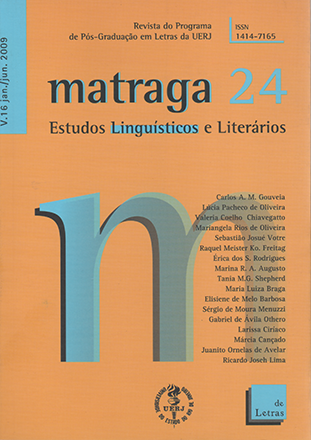Corpus Linguistics: theory, interfaces and applications
Keywords:
corpus linguistics, theory and corpus, empirical research, Brazilian Portuguese corpus, CORPOBRAS PUC-Rio.Abstract
The purpose of this paper is to present an overview of Corpus Linguistics, characterizing it as an area of research, considering its relations with other areas of study and illustrating its applications with specific focus on Brazilian Portuguese. In order to develop these topics, this research paper discusses Corpus Linguistics characteristics by pointing out some issues that distinguish it from other areas of research, such as: (1) its specific way to define language as well as a particular form to do empirical research on the basis of evidence extracted from linguistic corpora, using computational tools; (2) the possibility to generate theoretical contributions through new descriptions of different language uses; (3) the interfaces it establishes with Systemic- Functional Linguistics, Applied Linguistics and Computational Linguistics; (4) the expansion of the area in many countries, including Brazil, due to new perspectives opened in several fields, such as, lexicography, lexicogrammatical studies, genre and language variation studies as well as cross-cultural studies. The discussion of the topics above should reinforce the argument that Corpus Linguistics cannot be considered only as a methodological approach, but rather as a research area that allows for empirical linguistic knowledge, leading into new theoretical insights about language. In order to illustrate some corpus research done within the scope of Corpus Linguistics using data from the Portuguese language, three empirical studies are briefly described at the end of this paper. These academic works used data from the CORPOBRAS PUC-Rio, a corpus compiled with the purpose of representing Brazilian Portuguese.
Downloads
Downloads
Published
How to Cite
Issue
Section
License
Authorization
Matraga – Scientific Journal of the Post-graduate Program in Arts and Humanities of UERJ is authorized to publish the article submitted here, if it is accepted for online publication. It is attested that the contribution is original, that it is not being submitted to another publisher for publication, and that this statement is the expression of truth.
The works published in Matraga's virtual space – Scientific Journal of the Post-graduate Program in Arts and Humanities of UERJ will be automatically transferred, and your copyright is reserved to Matraga. Its reproduction, in whole or in part, is conditional on the citation of the authors and the data of the publication.

Matraga uses license Creative Commons - Attribution-Non-Commercial 4.0 International.





